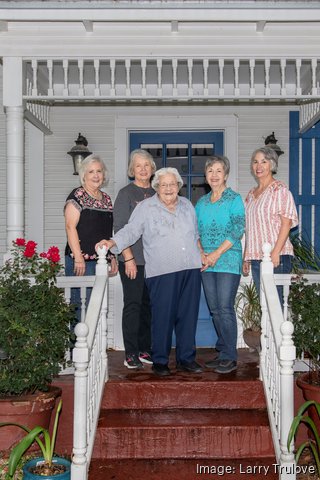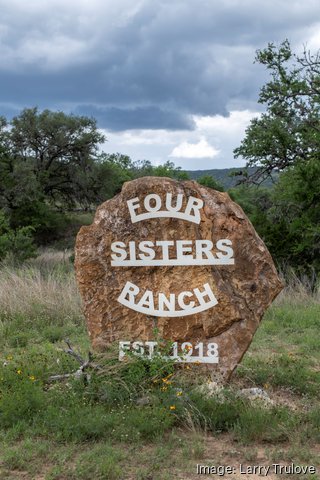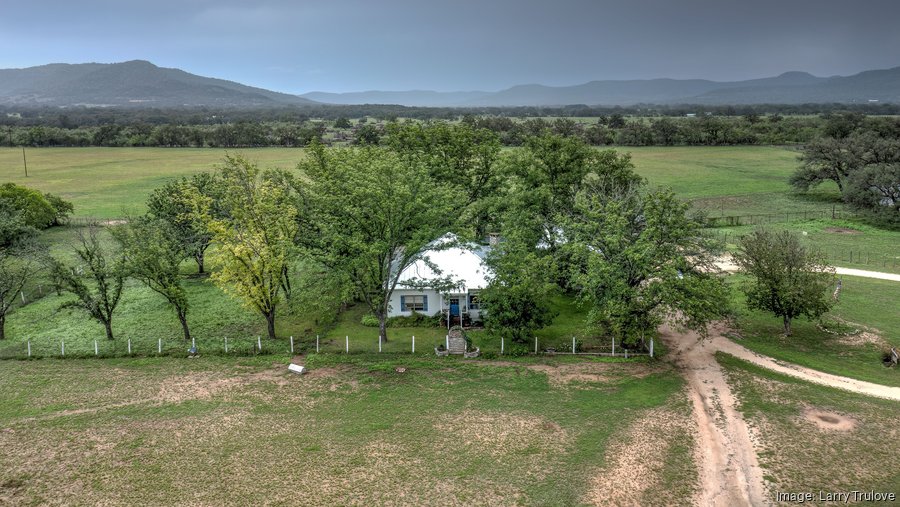The Four Sisters Ranch has grown and changed over its century plus history. Alice LeMond and daughters Diane Causey, Joan Clark, Kathy Lewis, and Betty Boyce remain the life-long owners of the property keeping the ranch in the family and central to their lives and the lives of all their children and grandchildren. “Starvation Hollar” is what the “old timers” called their valley in the Texas Hill Country because it was hard to make a living. It never really seemed to rain much in the area, and the rocky land had little topsoil. Purchased in 1918 by the sisters’ grandfather Sterling Fisher, himself a grandchild of early Utopia settler Reverend O. A. Fisher, Sterling settled his family in the hills where the beauty of God’s creation invokes the feeling of being closer to Him, both then and now.
The Four Sisters began managing the ranch with their husbands in the 90’s, although the girls credit Alice with having the strength to keep the property in their family’s hands. Alice doesn’t lose sight of the help she has gotten from ‘the men’, saying, “Don’t shortchange the son-in-laws. They have all done so much to help maintain the ranch and contribute to our overall success.” The girls developed the eco-tourism aspect of their natural resources building two rental cabins, some recreational vehicle hook-up locations, and starting the Utopiafest Music Festival in the beautiful horse-shoe-shaped valley on the Four Sisters surrounded by the majestic hills. The Fishers’ gift for food, family, and fun are shared with the many visitors who partake in the beauty of their Utopian hospitality at the annual events.
Lauren Causey Stiteler says, “Granny was afraid of the festival when we first started doing them. When she realized it was only one weekend a year, she came around to like it. She liked seeing how much folks enjoyed the ranch and how much fun everyone had. Music was always such an important part of Granny’s life, and we all followed suite. Our guests have always been respectful of our property.”
The Four Sisters will host upcoming Eclipse Utopia on October 13-14 of 2023 and again in April of 2024 at the festival site. The Great Texas Twoclipse is where the paths of totality for the coming solar eclipse will be at the epicenter of the event. The Texas valley on the ranch is a perfect spot to appreciate the event. They will limit entry to 1500 outside campers who will pre-purchase wristbands to enter the ranch. Musical bands from all over Texas will be featured along with food and souvenir vendors.
The sisters’ connection to Utopia’s roots run back to the 1850’s, but their ranch began with their grandfather, Sterling Fisher, who knew horses as well as his Bible. He broke horses for the cavalry in the 1920’s and 30’s. The Fishers, along with other local ranchers, struggled to make a living raising chickens, sheep, angora goats, cattle, and horses. They had to use whatever skills and resources they had to their advantage. The Kincaid Ranch in Sabinal bred mares for the U.S. Army. When the colts were old enough for riding, the Fisher men would round up the unbroken group and herd them from the Kincaid to the Fisher ranch, stopping at a switch-back road leading to D’Hanis to camp overnight. By the age of ten, young Billy Fisher was learning the ropes of a horse drive and often told tales to his daughters of how tired and scared he was at night. The coyotes howling in the ink black darkness of the county roadside scared the boy to his core, but even in his old age he fondly remembered his first time sleeping under the stars with the menfolk of his family.
Growing up, Billy met his wife, Alice Smart, at Utopia Methodist church services during the summertime when she lived at her ranch at the head of the Seco Creek about 14 miles from town. Travel to Utopia for school would have required crossing four bump gates, opening, and closing three gates, and crossing countless creeks, caliche, and mud. If it rained, the roads were impassible, so she and her siblings went to school in Sabinal where they lived during the week in a “town house,” a common practice for ranch families in early 20th century Texas. The young people socialized at dances at Garner State Park, upstairs in the dancehall above what is now Connell’s True Value in Sabinal, and in the hall behind Ranch House Antiques in Sabinal.

Alice and Billy married and moved into an old ranch house on the Fisher Ranch to start their family. Diane Fisher was their first-born, and four years later came Joan. The girls were raised doing the same chores that any son would have done in the 40’s. In 1948, Billy and Alice added more property to the ranch, acquiring an old, single walled, uninsulated wooden house along with the acreage. Even though the windows rattled when the wind blew, it was a larger house. Each room had a fireplace, the only heat available. The Fishers planted and tended pecan trees and fruit trees in their new yard, hoping for shelter and food sources to come. Kathy was born next into the family and filled the role of mascot for her older sisters. A fourth sister, Betty, joined the family nine years after Kathy, and then finally, Alice and Billy had a son. Billy Sterling Fisher, affectionately called “Brother” by his adoring family, arrived about the same time that Diane was leaving for Southwest Texas State University in San Marcos.
Alice raised her children with a balance between ranch work and traditional, proper activities. Alice says, “The girls came along first, so they were all raised to do boy’s work. They rode horses and roped from the time they could hold onto the reins.” They had no time for television or cartoons except for an occasional Gunsmoke or Lawrence Welk. “Daddy loved that piano player on Lawrence Welk,” Diane chuckles. Wanting her daughters to develop an appreciation for music too, Alice bought a piano from a traveling piano salesman. He had it in the open bed of his pick-up truck, and, with a little help from the family, got it moved into the house. All the girls took piano lessons and learned to sing in three-part harmony for local events. Joan Clark remembers the matching dresses that Alice made them wear for their special performances. She explains, “Our piano teacher would get us our ‘gigs’. Mother drove us, and he would meet us there. We sang for teachers’ groups and clubs not too far away. Our sister Kathy has an amazing voice. On car trips she sang Patsy Cline songs for Daddy to help him stay awake on late night drives home from the rodeo, or other events.”
Billy Fisher, the father, was quite the motivator, instilling in his family his love for rodeo performance. He felt that if they were going to show up and do something, they might as well win. June 20, 1952, was Utopia’s 100-year centennial celebration, and the first time Diane entered the ladies barrel race event on a green-broke gelding of Billy’s choice. A green broke horse is not very reliable. Diane was six years old, and her dad was the Arena Director. Her grandfather, Sterling Fisher, was entered in the rodeo as well, but in the “Old Men’s Match Roping” pitted against Rollie D. Harper. The elder gentlemen were billed as being “Champions of Yesterday.” Diane remembers the event clearly since Alice, a proud owner of a new home-movie camera, captured the event for posterity. Diane says, “I ran my barrels. Then, when I was coming home, the horse stuck his feet hard in the ground, and I went flying up over his head. Mom must have put the camera down, because when we watch the film, I flip over the horse and then the next scene you see is all of us swimming in the river at the dam. It looked like I’d gone over the horse’s head and landed in the river next.” The girls remember having Alice rewind and play that scene repeatedly midst peals of laughter.
Rodeo played an unmistakable role in the lives of the Fisher tribe for several generations. Alice remembers it as a family affair. “Every one of the kids competed in Rodeo, we often drove two cars pulling two trailers to the events. The kids shared the horses and tack. Joan and Diane sometimes competed against each other in the same age group.” Each sister developed her own unique area of agricultural interest as they matured. Diane was the only one in Utopia who raised Hampshire sheep during her high school days and sold them for show animals. She credits that and 4-H with helping her pay for her college. She also won the Texas State High School Championship Rodeo and won a Sportsmanship Award in 1964.
Joan chose to partner raising pigs with her grandfather, Sterling. She joined Diane at San Marcos where rodeo helped pay Joan’s way through her higher education. She won the Texas State All Around Champion Cowgirl recognition in 1964, so the whole family traveled to the national finals in Minnesota. She was serious competition at the collegiate level. “Dad bought me an old army green Chevy half ton truck. I loaded up a horse trailer, hay, two goats, two calves, and my horse so I could practice, and drove myself off to college,” Joan states. She met her future husband, Tony Clark, in Rocksprings at a rodeo. They developed their relationship through letters that continued through Tony’s tour of duty in the Army when he was stationed in Vietnam. Diane shares her memory of when he returned, “Tony lost 40 pounds in those 11 months. He barely made it home in time for his own wedding, and I didn’t recognize him when he finally got here.”

Diane Causey shares, “Mom had a big chicken and egg business in the late 50’s after she and Dad took over grandfather’s land payments and added to the ranch. She sold eggs to several grocery stores in Uvalde, and always had a garden. She was and is a great cook and served big noon meals which often included extra guests like county agents, horse buyers, and friends who just happen to stop by at noon.”
When the four sisters’ baby brother Billy, or Brother as they called him, was born, Diane was 17. By then, she was starting work on a teacher’s certificate and planning on marriage and making her own home with her husband Richie Causey, also a rodeo cowboy and cattleman. She and Richie had the first Fisher grandchild, Lauren, when Brother was only five years old. The Causey’s lived just down river from the Fishers, so Lauren and Brother were raised together and fought like they were siblings. Unfortunately, Brother’s life was cut short when he died from cancer at 29 years of age.
“You haven’t had a birthday until you have your Granny birthday. It’s always the Sunday lunch after the day of your birthday,” Diane Causey shares. All four girls and their spouses live on the ranch or in Betty’s case, close by in Vanderpool, so the family shares Sunday lunch at Granny’s every week taking turns bringing the steaming hot dishes of traditional Fisher favorites. “Joan and I keep track of who is doing what, and we will text everyone reminders,” Diane assures. Laura and Allison, Brother’s two daughters, are part of the family holidays, and contribute to the crowd of cousins, aunts, and uncles at lunch at Alice’s house, known lovingly to all as Granny. The piano from the traveling salesman is a centerpiece to family singalongs, resting not far from where it was originally unloaded. It offers a revelry that has woven its way through the celebrations of the following generations. Brother Fisher’s ten-year-old granddaughter, Shaylee Ketenbrick, has followed in the footsteps of her great-great grandfather, Sterling Fisher. She has already won numerous buckles and saddles and hopes to someday represent the fifth generation of Fishers performing in a Utopia Rodeo.
Joan, like Diane, also became an educator, and taught math in Utopia for decades. She and Tony settled within eyesight of Alice’s house, building their own home and running the cattle operation on the Four Sisters. Joan shares, “We planted grapevines in 2010 and had our first harvest in 2012. We sold our grapes to Lost Maples Winery in Vanderpool, but the drought, freezes, and the horrible hailstorm stripped the vines in 2021. The grapes were reduced to sticks.” In the past, they hosted grape harvesting parties in August with food and people gathering to help, visit, and taste last year’s wine. Now, they are hoping to get enough of a crop to make grape jelly this year.
Alice Fisher LeMond has spent her entire lifetime ensuring that her children and grandchildren have a place to gather and call home. Though it has doubled in size, she is still renovating and improving the house. She shares, “The latest hail and windstorm was a blessing. The night it came in, I kept all my clothes on and closed myself off in the back bedroom. The next morning, there was glass all over the living room and kitchen. It destroyed the roof, but it was a blessing. We got a new roof, windows, and siding.” Alice has spent over 90 years choosing to make the best of every situation, regardless of how grim it may look.
The Four Sisters Ranch has survived the great depression, the historic 1950’s drought, and the drought of 2022. Alice and Billy Fisher were blessed with five children, nine grand-children and 17 great-grandchildren. Remains of the original homestead from 1918 include a hand-dug well, pear tree and front step of the original old Fisher settlement. In the past, Alice has protected the tilting cedar post pens from a bulldozer by placing herself in front of the dozer, demanding the driver not to destroy the historic site. Diane Causey reflects the family sentiment when she states, “We have been blessed to live in such a beautiful place. We have enjoyed sharing it with those who may have never seen a dark sky at night, a wild turkey strutting, an armadillo, or hummingbirds swarming a feeder. The peace that comes from the quiet sounds of wildlife and the views of blue hills in the late afternoon have blessed many including each of us that are privileged to call it home.” Diane continues, “The other day, we all got our taxes and saw that we would be millionaires if we sold. What would we do with a million dollars, though? It would ruin our lives.” For those at Four Sisters Ranch, what they have is already priceless.
